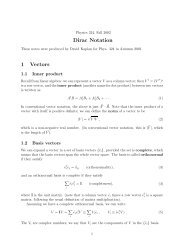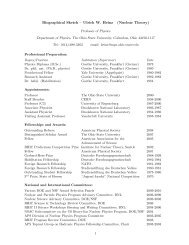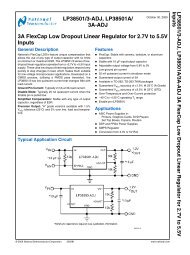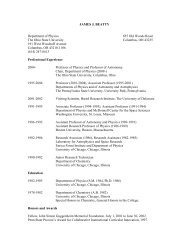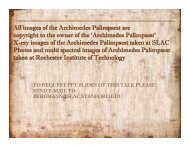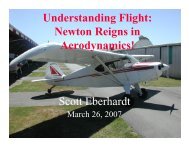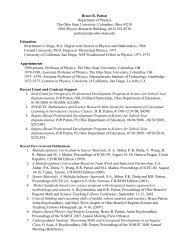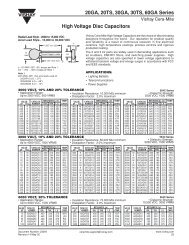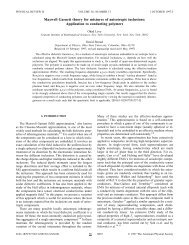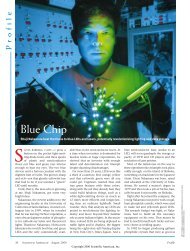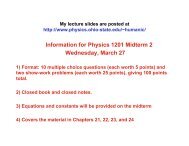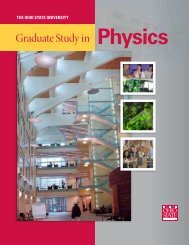Brasil Final Report - Department of Physics - The Ohio State University
Brasil Final Report - Department of Physics - The Ohio State University
Brasil Final Report - Department of Physics - The Ohio State University
You also want an ePaper? Increase the reach of your titles
YUMPU automatically turns print PDFs into web optimized ePapers that Google loves.
104<br />
COMMENTS AT THE FINAL SESSION OF THE VII IACPE<br />
Marco Antonio Moreira<br />
Instituto de Física, UFRGS<br />
91501-970 Porto Alegre, RS, <strong>Brasil</strong><br />
moreira@if.ufrgs.br<br />
At the close <strong>of</strong> this VII Interamerican Conference on <strong>Physics</strong> Education I would like to<br />
use this last opportunity to express my deep concerns with the present state <strong>of</strong> physics education,<br />
and with the preparation <strong>of</strong> physics majors and physics teachers, in many <strong>of</strong> our countries.<br />
Regarding physics education, I am specially worried about what is happening at secondary<br />
school level. Within a few months we will enter the 21st century whereas the physics taught in our<br />
secondary schools usually does not go beyond the 19th century. Within a short period <strong>of</strong> time there<br />
will be a one century gap between contemporary physics and the physics we teach to our students.<br />
Besides teaching a chalk and blackboard physics, full <strong>of</strong> formulae and <strong>of</strong> problems which are not<br />
much more than rote exercises, we teach an "old physics", not aiming at citizenship and with little<br />
use <strong>of</strong> new technologies.<br />
<strong>The</strong> secondary school physics curriculum must be updated, urgently, in at least three<br />
aspects: 1) the incorporation <strong>of</strong> modern and contemporary physics topics; 2) the taking into account<br />
that the vast majority <strong>of</strong> secondary school students are not going to be physicists; 3) the effective<br />
use <strong>of</strong> new technologies as teaching and learning aids.<br />
We have to dismiss arguments such as the one that assumes it is not possible to teach<br />
modern and contemporary physics topics because students are not prepared or because these topics<br />
are too abstract (abstract is the always taught mechanics) and we have to find ways <strong>of</strong> inserting such<br />
topics into the secondary school curriculum leaving aside, <strong>of</strong> course, some classical topics.<br />
Examples that this is possible might be found in papers presented in this meeting and in the<br />
workshops on laser applications and on the use <strong>of</strong> charts and materials from the Contemporary<br />
<strong>Physics</strong> Education Project. Obviously, this implies teacher preparation, a subject I will comment<br />
later on.<br />
It is also necessary to teach physics with a different approach, presenting it as a way <strong>of</strong><br />
modelling nature, as a live science useful for citizenship in contemporary society, abandonning,<br />
definetely, the old habit <strong>of</strong> teaching it as if all students were undergoing scientific. Scientific<br />
education is one thing, scientific training is a different one.<br />
We must also change our instructional strategies as a consequence <strong>of</strong> the availability <strong>of</strong><br />
new technologies, recognizing that today's world is not just the old world plus the new technologies,<br />
it's a new world. Thus, teaching today must be thought not as the old teaching plus the new<br />
technologies, but rather as a new teaching. Of course, I am not talking about just using the most<br />
fashionable s<strong>of</strong>twares, or <strong>of</strong> just making old texts, and the ubiquitous lists <strong>of</strong> problems, available in<br />
the internet, but rather about teaching in a different way.<br />
No doubt, these three points are three big challenges for secondary school physics:<br />
contemporary physics, physics for citzenship, and physics teaching with new technologies.<br />
Regarding the preparation <strong>of</strong> physics majors and physics teachers, my concerns have to do




